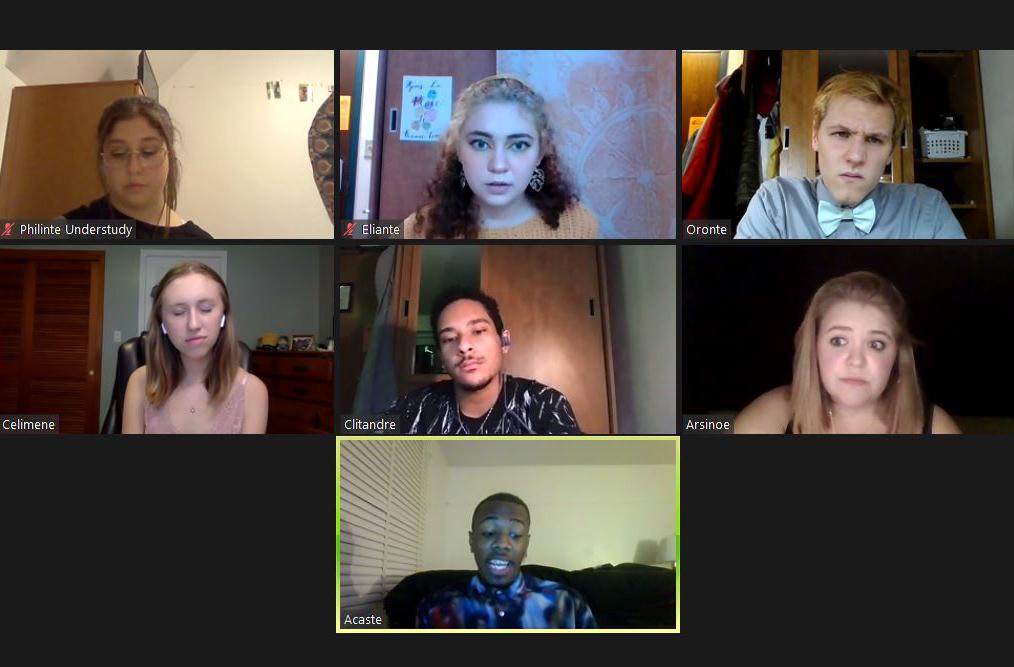While the SUNY Oswego production of Moliere’s “The Misanthrope” will translate a 17th century play into a virtual environment, viewers might see a lot of connections with the story.
The play, which has five showings between Oct. 16 and 18, is a comedy of manners where a number of characters attempt to win favor with Célimène, played by Natalie Griffin. The characters are all very concerned about their power, status, connections and appearances.
Griffin hopes audiences will “recognize how many of the issues and the themes that were relevant back when this play was written hundreds of years ago on French high society. It's actually still very relevant to our lives today. In some ways, our society today isn't that different than how it was back then.”
Theatre faculty member and director Steven Mazzoccone, a 2006 SUNY Oswego graduate, said the production sort of plays out as if Célimène invited all the characters to a Zoom meeting with her, and the plot made it ideal for a virtual presentation.
Mazzoccone was approached about directing an online production over the summer, which he said led him through “a Rolodex of plays in my mind” as to what would work best in this format.
“It just felt like the dialogue and the language and the plot was compressed together so it could work online, because the play happens real time via these discussions,” Mazzoccone said. “We can't have a set. We can't have spectacle. But we can have time and space which are the main building blocks of theater.”
The rest of the cast includes Kieran McCormack as Alceste; Phillip Jones as Philinte; Nicholas Sweet as Oronte; Ryan Figueroa as Clitandre; Kamal Morales as Acaste; Claire Bosley as Éliante; Mal Devisser as Arsinoé; Winston White as Basque/DuBois; and Seth Nesbitt as Guard.
Social commentary
In researching the play, Mazzoccone was fascinated by how different this was from most productions by Moliere. The playwright is better known for commedia dell'arte plays that rely on stock characters and household comedic themes, but Moliere wrote “The Misanthrope” later, and it seems more like political commentary, Mazzoccone said.
“His father was directly employed by the King of France and Moliere was sort of destined to take over that position from his father, and so he was sort of brought up in court life,” Moliere said. “But he decided he wanted to be an actor instead, so he formed his own theater company.”
Touring Europe took Moliere out of his bubble, as he saw so much destitution and suffering very different from his upbringing, and how great the divide was between the rich and the poor, Mazzoccone noted.
“His play feels like a critique of what happens to a society when power is only given to a select few who have everything they already want to have and the whole function of the government is to maintain power of a select individual group of wealthy people,” Mazzoccone said. “All of his plays are satirical but this one just felt like a very big public arraignment for the people in the court. And what's so brilliant is that it happens under the guise of a romantic comedy.”
Staging virtually
While a virtual staged reading was planned originally, Mazzoccone said they all decided to go with memorizing lines and with as full a production as possible. They are using a newer 21st translation by Constance Congdon that retains the rhyming couplets and heightened language, but is still very accessible and relevant, the director said.
“It looks kind of daunting but once you really get familiar with the words and the rhythm of it, it becomes very natural,” said Griffin, a junior double major in theatre and in gender and women’s studies. “Especially when you figure out what your character is doing, your objectives and everything, it flows very naturally.”
Kuvar Bhatnagar, a sophomore dual major in theatre and technology education, serves as a dramaturg for the production, where his role is “to study the play, its language, and topics,” Bhatnagar said. “I then create pages on the (Dramaturgy Hub) Google site for people to use as a resource. I also attend rehearsals to answer any questions and give insight to any issues.”
Not having regular in-person rehearsals makes it a bit more challenging, but Bhatnagar has learned about better ways to interact with others online as a result.
“My biggest hope for the audience is that the audience grabs the thought to question their society and what it means to fit in,” Bhatnagar said. “To question what being in society really means. There’s also the hope to relate to the characters, for writers to match up with the wit of Alceste or Oronte, or for women to relate to the empowered Célimène.”
Normally, performers would get to hang out with each other before, during and after rehearsals to develop chemistry, which means connecting on a meaningful level via Zoom is a new challenge, but still achievable, Griffin said.
“I'm just really grateful to have an experience,” Griffin said. “During all this, just to have something somewhat familiar to the theater that we're used to. I think it's really important that we do what we can. Even if it's over, Zoom, it's still something.”
“I've seen theatre magic happen,” Mazzoccone said. “I've seen really successful Zoom productions. And I've seen certainly my students excel when they commit and when they are fully in the moment and fully in the character. And so it can be done. And I think for ‘The Misanthrope,’ it will be done.”
Virtual showtimes are 7:30 p.m. Friday, Oct. 16; 2 p.m. and 7:30 p.m. Saturday, Oct. 17; and 3 p.m. and 7:30 p.m. Sunday, Oct. 18. Reservations are available via tickets.oswego.edu.




